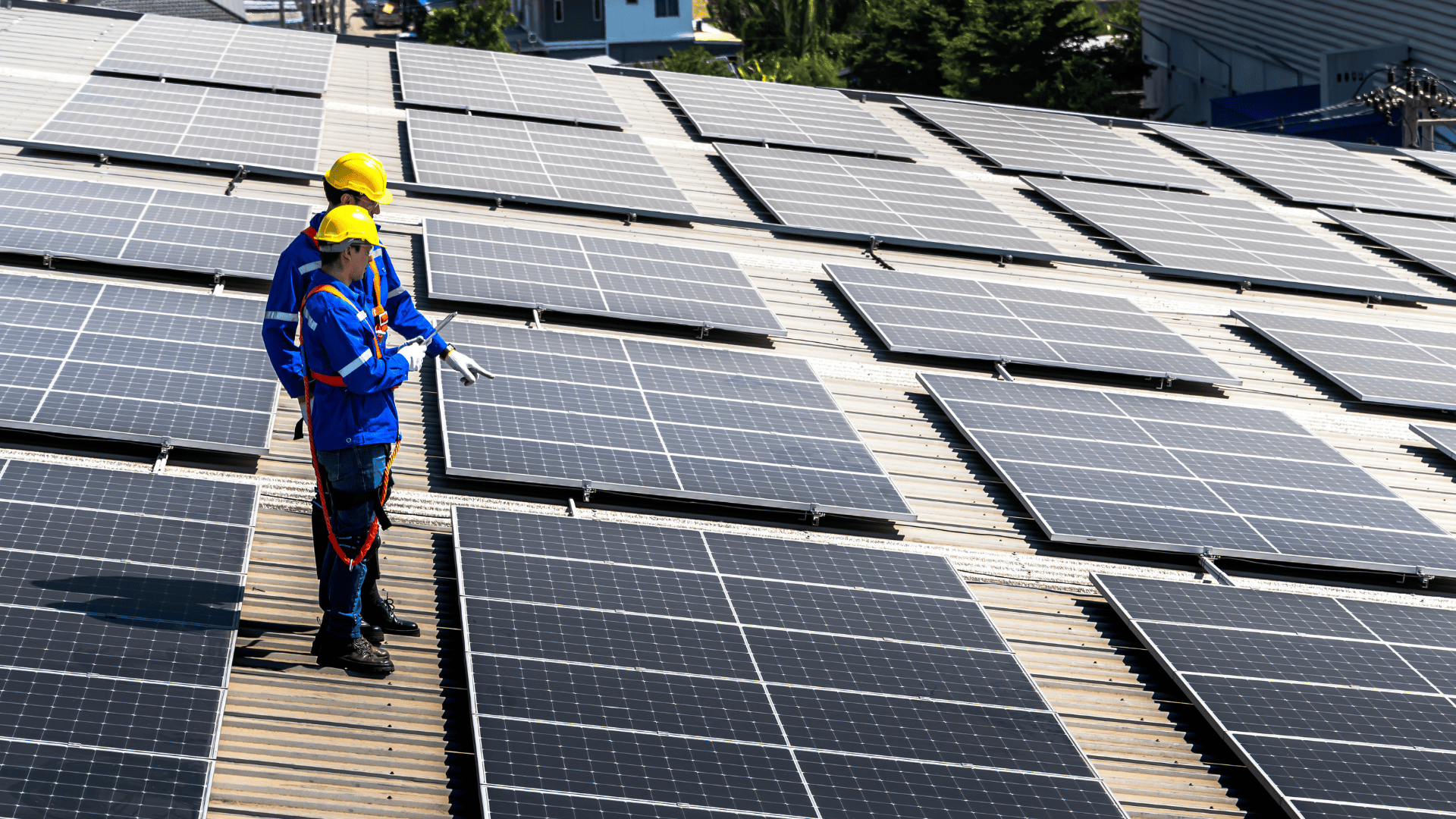CRM for Solar Installers: The Features That Matter Most in 2025
February 19, 2025
A modern-era reality is that generic service just doesn’t cut it anymore. Homeowners don’t just want a solar system; they desire a customized solution tailored to their energy needs, budget, and lifestyle.
But how can you provide that level of personalization while handling countless leads, site visits, and installations? What exactly do you need? Well, you need the power of a Solar CRM that keeps your customers engaged and your business ahead of the game.
Solar CRM software does more than manage leads; it simplifies operations, automates follow-ups, and guarantees that every customer interaction feels personalized to their needs.
The right features can distinguish between a one-time sale and a long-term, referral-generating relationship. So, what should you look for in a solar CRM in 2025? Let’s find out!
Key Takeaways
- The growing complexity of solar sales and rising customer expectations necessitate advanced CRM solutions for competitiveness.
- Essential CRM features include lead management, workflow management, instant proposal generation, mobile access, integration with finance tools, advanced analytics, compliance automation, and scalability, which are vital for solar installers.
- Monitoring future trends in CRM for solar installers enhances efficiency and customer experience.
- Advanced CRM software like Sunbase can help you stay ahead of the game!
Why Solar Installers Need a Next-Gen CRM in 2025?

Let's find out!
1. The Growing Complexity of Solar Sales
Solar sales aren’t what they used to be. The days of basic pitch decks no longer impress clients.
Installers today navigate complex regulatory requirements, as net metering rules, tax credits, and permits differ by state and sometimes by zip code. Not to mention that other local solar companies are vying for the same rooftops as you.
2. Rising Customer Expectations
Today’s solar buyers are knowledgeable, impatient, and seek a seamless experience.
- They compare quotes and choose the one that works best for them.
- They want instant answers where delayed responses can cost you leads.
- They demand transparency, from ROI calculators to instant installation updates.
3. Data-Driven Decision Making
It's 2025, and it's high time you must collaborate with data to stay ahead. Question: Do you have this data at hand?
- Which neighborhoods have the highest conversion rates?
- What’s the ROI of your marketing campaigns?
4. Staying Competitive in a Bursting Market
The solar industry is surging, and global installations are set to increase in the coming years. But with growth comes chaos.
Solar businesses that hold on to spreadsheets and sticky notes might struggle to keep up with all the chaos around them.
Moral: A next-gen CRM acts like your co-pilot, overseeing compliance checks, handling incentives, and organizing customer data.
> Statistic Highlight

Over 65% of companies consider CRM tools extremely effective. Additionally, Nucleus Research reveals that CRM ROI is $8.71 for every dollar spent.
From 2024 to 2030, solar technology is projected to drive 80% of the growth in global renewable capacity.
If you are new to adopting a CRM in your business, here is a blog for Understanding Solar CRM: A Beginner’s Guide.
The Must-Have CRM Features for Solar Installers

Even the most up-to-date platform with amazing features could have a 90s-era UI that is extremely difficult and nearly impossible to use.
Navigating your preferred CRM should save you time rather than wasting it. Here's a checklist to lighten your workload!
1. Smart Lead Management and Automated Follow-Ups
A CRM helps you filter high-priority leads, automates follow-ups while you rest, and forecasts which homeowners will most likely convert. Additionally, sales automation saves you some extra hours for other work.
So you can:
- Efficiently capture leads from various sources, such as website forms, calls, and referrals.
- Automatically direct leads to the right sales representative based on location or other criteria.
- Set up automated email and SMS to nurture leads at different sales funnel stages.
2. Seamless Workflow and Project Management
Your solar customer relationship management software should be able to manage all your past, present, and future projects.
This will ensure you can always:
- Monitor project advancement across various phases, including site survey, proposal, installation, and permitting.
- Allocate tasks to team members with exact deadlines and assigned responsibilities.
- Visualize the sales pipeline by offering clear status updates for every lead or project.
3. Instant Solar Proposal Generation and Design Capabilities
What if you could generate a polished, personalized solar proposal in a few minutes, complete with 3D designs and financing options, without missing any details and ensuring accuracy? How?
Seek a software solution that integrates features for both pre-sale and post-sale processes, enabling you to easily create professional solar proposals with accurate pricing tailored to customer location and system design.
Lastly, connect with solar design software for automatic proposal data entry and enable proposal personalization with branding and pricing choices.
4. Mobile CRM with On-the-Go Accessibility
Device compatibility is one of the forgotten aspects of solar CRMs. The software frequently neglects its mobile functionality, leaving users with a desktop or web platform incompatible with mobile or tab.
For example, after visiting a customer, you find another potential lead. You want to show the homeowner the savings potential of solar energy while he is outside, but your CRM doesn't work with your phone or tablet.
If you can't access your tools, is it worth losing a lead? You should be able to utilize your solar CRM anytime and anywhere, whether through a desktop or a mobile.
5. Integration with Financial Tools
Nobody wants to spend their entire day switching between apps to finish their work.
Integration handles invoicing, payment processing, and financial reporting. This saves you from tedious manual data entry and ensures your data is accurate across every platform.
This is why integrating financial software into your solar CRM solution is essential for success in today's sector.
6. Advanced Analytics and Reporting
Knowing how well your firm is performing is a prerequisite for expansion.
Advanced analytics and reporting can extract sales patterns, conversion rates, and project timeframes from a CRM.
Custom dashboards ensure a data-driven approach to corporate planning by assisting decision-makers in monitoring important metrics and streamlining procedures.
7. Compliance and Document Automation
Navigating contracts, permits, and compliance standards can be tougher than installing solar panels.
Document automation simplifies paperwork by guaranteeing that a CRM automatically creates and saves all required contracts, forms, and compliance documents.
Integrating e-signatures helps streamline approvals, keeping our projects moving smoothly and quickly.
8. Scalability and Customization for Business Growth
Once you have the above seven features, now you need something for growth and adaptability.
Choose a CRM that allows you to customize it to meet your unique requirements and adjust it to shifting market conditions. This guarantees that your CRM will continue to be a valuable asset for your company as it evolves.
So, if your CRM fails to tick all these essentials, it’s time to change.
Read more in detail about the Top 10 Ways CRM Software Can Transform Your Solar Business.
Looking Ahead: The Future of CRM for Solar Installers

> What are the Key Trends to Watch
1. AI-powered lead qualification:
It's time to focus on ready-to-convert leads. AI transforms lead qualification by analyzing vast amounts of data to find the best prospects.
AI-driven CRM systems can analyze lead behavior, demographics, and energy patterns to predict conversion likelihood.
2. Smart home integration:
As smart home technology grows, CRM systems will integrate with devices like thermostats and energy monitors.
This will allow solar installers to provide personalized energy management solutions and monitor performance in real-time.
3. Self-service customer portal:
The future of CRM features self-service customer portals that enable account management, project tracking, and online access to support resources. So, how about customers track installation progress, pay invoices, or schedule maintenance without calling your sales team?
These portals improve transparency and control, boosting customer satisfaction and easing pressure on your service team.
4. Blockchain for secure transactions
Blockchain is not only for crypto. Solar CRMs will utilize it as well. Eliminate fraud, delays, and paperwork issues. Blockchain technology connects and streamlines solar energy transactions, from financing to trading.
Integrated CRM systems enhance customer visibility into energy usage, performance, and financial dealings. This transparency promotes trust and minimizes disputes, improving customer experience.
Take a look at Crypto Mining's Dependence on Renewable Solar Energy: Opportunities for Installers.
5. Hyper-personalized marketing
Marketing's future lies in hyper-personalization, providing a tailored message to each customer.
CRM systems will use advanced analytics and AI to create targeted marketing campaigns based on customer preferences and energy consumption patterns. This level of personalization will boost conversions and enhance brand loyalty.
Now you know why your CRM must evolve to keep up!
Why Is Sunbase Solar CRM The Ultimate Tool For Solar Installers?

With the #1 CRM designed for solar professionals, you can take control of your leads, accelerate your sales process, and close more deals.
With Sunbase, you can:
- Automate Lead Management: Capture and assign leads instantly for lightning-fast follow-ups.
- Track Sales Like a Pro: Real-time dashboards and leaderboards keep your team motivated.
- Effortless Proposals & Contracts: Customizable templates to make your proposal process simpler.
- Stay Connected Anywhere: Access your CRM on iOS, Android, or any device.
- Secure Cloud Storage: Rest assured, your data is always safe and just a click away!
The solar sales environment is dynamic, and clients expect smooth communication. With Sunbase Solar CRM, you maintain control, whether on a rooftop or in a client meeting.
In a nutshell
So, what's so special about solar CRM? The fact that it makes your customer special!
Regardless of the CRM you select, you can trust that it will automate your business operations, boost your revenue, and enhance customer retention rates.
Ultimately, it should be a platform designed for Speed, Accuracy, and Scalability.
About Sunbase
Looking for the right solar CRM software? We just made it easier for you!
All you have to do is contact us here!
FAQs
1. How can a CRM assist with lead generation for solar installation business?
A CRM captures leads from multiple sources like website forms, marketing campaigns, and referrals. It tracks interactions and segments leads by their potential, enabling more effective targeting of your marketing efforts.
2. Can a CRM automate marketing efforts?
Indeed, contemporary CRMs provide marketing automation capabilities, enabling you to plan and dispatch customized email and SMS campaigns, cultivate leads, and monitor the success of your marketing initiatives.
I agree to receive marketing messaging from Sunbase at the phone number provided above. I understand data rates will apply, and can reply STOP to OPT OUT.
Company
Industries
Features
Copyright ©2021
Terms of Service |
Privacy Policy







